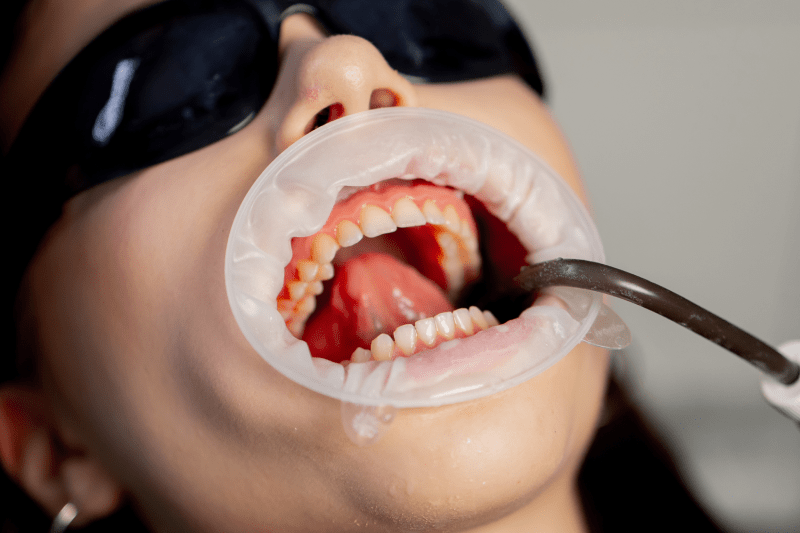The Pros and Cons of Different Types of Veneers in Turkey
Turkey has earned a worldwide reputation for offering affordable yet high-standard aesthetic dental treatments. This content answers the most frequently asked questions about dental veneers, comparing the advantages and disadvantages of different types of veneers such as porcelain, composite, zirconia, and E-max. This will help you make the right decision to transform your smile. For more information and to create a personalized treatment plan, you can contact Cure Holiday.
What are the Different Types of Veneers in Turkey?
The most common types of dental veneers used in Turkey are porcelain veneers, composite veneers, zirconia veneers, and E-max veneers. Each type offers unique characteristics in terms of aesthetic appearance, durability, cost, and application process. The choice is made based on the patient’s current dental condition, aesthetic expectations, budget, and the dentist’s recommendation. This variety ensures that everyone can find a solution that suits their needs.
What are the Advantages of Porcelain Veneers?
Porcelain veneers offer an aesthetic appearance that is closest to natural tooth enamel. Thanks to their translucency, they provide a bright and vibrant look similar to natural teeth. They are also highly resistant to staining and are not easily affected by colored foods and drinks like coffee, tea, or wine. Their durability and longevity, which can last 10-15 years or more with proper care, are among their biggest advantages.
What are the Disadvantages of Porcelain Veneers?
The most significant disadvantage of porcelain veneers is their higher cost compared to other types of veneers. The application process can take longer because they are custom-made in a laboratory and usually require multiple appointments. Since porcelain veneers require a certain amount of natural tooth enamel to be shaved off, the procedure is irreversible. Additionally, if they crack or chip, they need to be completely replaced rather than repaired.
What are the Advantages of Composite Veneers?
Composite veneers are a more affordable and quicker solution compared to other veneers. They can be applied directly to the tooth by the dentist in a single session, which saves time. Since they require very little intervention on the natural tooth enamel, they are one of the most conservative treatment methods. If they break, they can be easily repaired, and this process, unlike porcelain veneers, can be completed in a single appointment.
What are the Disadvantages of Composite Veneers?
Composite veneers are less durable than materials like porcelain or zirconia and have an average lifespan of 5-7 years. Due to their porous structure, they are more prone to staining and their color can change over time. For this reason, consumption of products like coffee, tea, and tobacco should be limited. They may also offer a less natural shine compared to porcelain veneers and may require more frequent maintenance or replacement.

What are the Pros of Zirconia Veneers?
Zirconia veneers offer a perfect balance between aesthetics and durability. Being an extremely strong material, zirconia is ideal for back teeth where chewing forces are high. It provides an aesthetic appearance close to natural teeth while also being resistant to staining. It is highly compatible with gum tissue, minimizing the risk of gum recession and not causing allergic reactions.
What are the Cons of Zirconia Veneers?
Zirconia veneers have a more opaque structure compared to E-max veneers. Therefore, when used on front teeth, they may not transmit light as well as natural teeth and can give a slightly matte appearance. Due to their thickness, they may require more tooth enamel to be shaved off. They can also be slightly more expensive than other aesthetic veneer types.
What are the Pros of E-Max Veneers?
E-max veneers offer the highest level of aesthetic results. Thanks to their high translucency, which closely resembles natural tooth enamel, they provide an extremely bright and natural appearance. Due to their thin structure, they require very little tooth reduction, which helps preserve more natural tooth tissue. Although their resistance to cracking is high, they are the most preferred type of veneer for addressing aesthetic concerns in front teeth.
What are the Cons of E-Max Veneers?
E-max veneers are not as durable as zirconia, so they may not be ideal for back teeth where chewing forces are high. Since they are made of a single piece of ceramic, they can be difficult to repair and may need to be completely replaced if they break. They can also be more costly than other types of veneers, and the application process may be longer due to laboratory work.
In Which Cases Should Each Type of Veneer Be Preferred?
The choice of veneer depends on individual needs. If aesthetics are the primary concern and the budget is suitable, E-max or porcelain veneers are ideal for front teeth. If cost and speed are important, composite veneers can be preferred. If durability and strength are the main priorities, especially for back teeth, zirconia veneers are the most suitable option.
Does Getting a Porcelain Veneer Damage My Teeth?
Porcelain veneers require a very thin layer of enamel to be shaved off the front surface of the teeth. This procedure allows the veneer to fit perfectly onto the tooth and helps achieve a natural appearance. When performed by an experienced dentist, the procedure does not harm the tooth’s health; on the contrary, it strengthens and protects the tooth’s structure. However, since this procedure is irreversible, it is a decision that should be carefully considered.
How Much Do Veneers Change My Tooth Color?
Veneers can completely change the color of your teeth. Materials like porcelain and zirconia are highly resistant to stains, so they maintain their initial whiteness for many years. Composite veneers, on the other hand, may change color over time, so regular maintenance and polishing sessions may be necessary. You can determine the most suitable color for you with your dentist using digital smile design applications.
Which Type of Veneer Has the Longest Lifespan?
The longest-lasting type of veneer is generally zirconia veneers. Thanks to their strong structure, they are highly resistant to chewing forces and can last 15-20 years or more with proper care. Porcelain veneers are also long-lasting and can be used for 10-15 years, while the lifespan of composite veneers is usually limited to 5-7 years.
What Brand of Veneers Do Clinics in Turkey Use?
Reputable and accredited dental clinics in Turkey use products from internationally recognized and high-quality brands such as IPS e.max, Lumineers, and Zirconia (KATANA). These brands guarantee the best results in terms of longevity and aesthetics. Your dentist will determine the most suitable brand and material for you.
What Factors Affect Veneer Prices?
Veneer prices vary depending on the type of material chosen, the number of teeth to be veneered, the dentist’s expertise, and the location of the clinic. Prices may be higher in major cities like Istanbul and Antalya, while more affordable prices can be found in smaller cities due to competition.
Is the Veneer Procedure Painful?
The veneer procedure is generally painless. Since local anesthesia is administered during the tooth reduction process, you will not feel any pain or discomfort. Afterward, there may be some mild sensitivity, but this usually subsides quickly and can be easily managed with prescribed painkillers.
Which Veneer is Suitable for Closing Gaps Between Teeth?
Both porcelain and composite veneers can be used to close gaps between teeth (diastema). However, the size of the gap and aesthetic expectations are important. For small gaps, composite veneers can offer an effective solution in a single session, while for larger gaps, porcelain veneers can provide a more permanent and aesthetic result.
Why are Veneer Prices Lower in Turkey?
The main reason for the low dental veneer prices in Turkey is that the general cost of living, labor, and laboratory expenses are more affordable than in other countries. This allows clinics to offer competitive prices without compromising on quality. Additionally, the high volume of patients in medical tourism helps clinics keep their costs down.
Do Veneers Cause Tooth Sensitivity?
After the veneer application, especially if tooth reduction has been done, you may experience temporary sensitivity. This sensitivity is usually to hot and cold foods. It is expected to pass within a few days. If the sensitivity persists, it is important to consult your dentist.
Which Type of Veneer is Most Resistant to Cracking?
Zirconia veneers are the most resistant to cracking. Therefore, they are an ideal option for people who have a habit of grinding their teeth (bruxism) or who want to get veneers on their back teeth. E-max veneers are also quite durable but are not as strong as zirconia.
How Should I Care for My Veneers After the Procedure?
Post-veneer care is the same as the care for your natural teeth. You should brush your teeth twice a day, floss, and use mouthwash to complete your oral hygiene. Avoiding biting on hard foods and habits like nail-biting will extend the life of your veneers.
How Long Should I Plan to Stay in Turkey for Veneers?
For veneers such as porcelain, zirconia, or E-max, a travel plan of 5 to 7 days is usually sufficient. This period covers the initial examination, tooth preparation, impression taking, veneer production in the lab, and final placement on the teeth. Composite veneers, on the other hand, can usually be completed in a single appointment.
How Long Until Veneers Lose Their Shine?
Porcelain and zirconia veneers, thanks to their stain-resistant and smooth surfaces, maintain their shine for many years. Composite veneers, however, may lose their shine over time. However, with regular dental checkups and polishing sessions, the shine of composite veneers can also be maintained.
How to Choose the Best Clinic for Veneers?
When choosing the best clinic, you should consider the experience of the surgeon or dentist, clinic accreditations (e.g., JCI), technological equipment used (like CAD/CAM), and patient reviews. It is important to choose a clinic with a transparent pricing policy and that offers post-operative follow-up services.

Who is Not a Suitable Candidate for Veneers?
People with serious oral health problems such as gum disease or teeth grinding (bruxism) cannot get veneers until these issues are treated. Additionally, if the teeth to be veneered do not have enough enamel or have severe decay, veneers may not be a suitable option.
What is the Difference Between Composite and Porcelain Veneers?
Composite veneers are made from a resin material applied directly to the tooth by the dentist and are completed in a single session. Porcelain veneers are thin layers of porcelain produced in a laboratory and require multiple appointments. Porcelain is more aesthetic, durable, and stain-resistant, while composite is more affordable and can be easily repaired.
What is the Difference Between a Zirconia Veneer and a Crown?
A crown is like a “cap” that covers the entire damaged tooth. Zirconia crowns are used for the full restoration of a tooth or as a prosthesis over an implant. A zirconia veneer, on the other hand, is a thinner layer that only covers the front surface of the tooth and is preferred for aesthetic purposes.
What Condition Should My Teeth Be in Before Getting Veneers?
Your teeth and gums must be healthy before you get veneers. If there is any decay, gum disease, or infection, these problems must be treated first. A healthy foundation is necessary for the success of the veneer.
Do Clinics in Turkey Offer Guaranteed Services?
Many reputable clinics in Turkey offer guarantees for veneer treatments. This guarantee may vary depending on the quality of the material used and the type of treatment. It is crucial to clarify what happens in case of a problem, the scope of the warranty, and its duration before the surgery.
What are the Most Preferred Color Shades?
The most preferred color shades range from natural white to brighter and more dazzling tones. With digital smile design, the most suitable color tone is determined based on your skin tone, facial structure, and personal preferences. A color choice that is harmonious with the surrounding teeth is made for the most natural and aesthetic results.
Do Composite Veneers Need to Be Replaced?
Yes, composite veneers are not as long-lasting as porcelain veneers in terms of durability and aesthetics. After about 5-7 years, they may lose their shine, become stained, or develop small cracks. In such cases, the veneers may need to be replaced or a polishing procedure may be required.
What is the Main Difference Between Zirconia and Porcelain Veneers?
Zirconia veneers are stronger and more durable than porcelain veneers. Porcelain, on the other hand, transmits light better, providing a more natural aesthetic look. For this reason, porcelain is often preferred for front teeth, while zirconia veneers may be a more suitable option for back teeth.
What is Included in the Prices?
The prices for veneers in Turkey usually include the dentist’s examination, panoramic X-ray, tooth preparation, temporary veneers, and the placement of the final veneers. Some clinics offer all-inclusive packages that also include accommodation and transfer services.
Which Type of Veneer Requires More Tooth Reduction?
Generally, zirconia veneers may require more tooth reduction than porcelain veneers due to their thickness. Veneers like E-max, thanks to their thin structure, require the least amount of tooth reduction.
Which Type of Veneer is More Compatible with Gum Tissue?
Both porcelain and zirconia veneers are highly compatible with gum tissue because they are biocompatible materials. These veneers do not cause any reactions or inflammation in the gums, which is important for long-term oral health.
How Do I Choose the Right Type of Veneer for Myself?
To choose the most suitable type of veneer, you should have a detailed consultation with your dentist to evaluate your expectations, budget, and oral health. The dentist will help you make the right decision by explaining the potential outcomes of each option for you.
For more information about the different types of veneers in Turkey and to create a personalized treatment plan, you can contact Cure Holiday.



